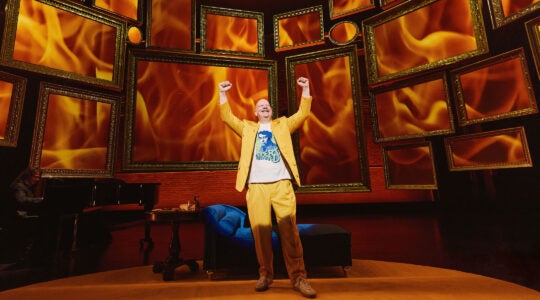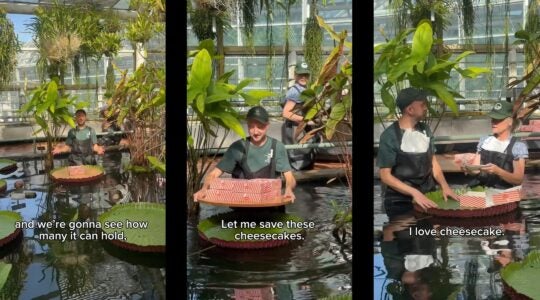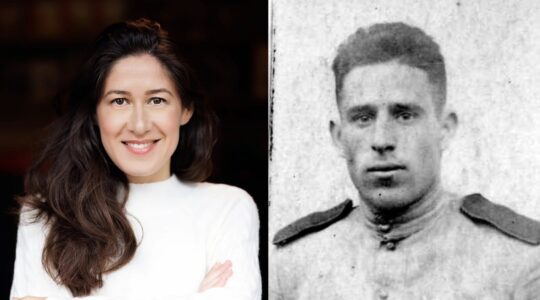In a hotel room in Midtown Manhattan 13 years ago, I learned a lesson about the simplicity of heroism.
Joe Schlesinger, a Czech-born, semi-retired journalist whose work on the Canadian Broadcasting Corporation I had watched for years while growing up in Buffalo, sat across from me. Next to him was Nicholas Winton, a one-time stockbroker in London whose good works were the subject of a documentary that had premiered here the previous day.
“The Power of Good” described how Mr. Winton had formed a one-man Kindertransport in 1939 that brought nearly 700 children from Nazi-annexed Prague, most of them Jewish, to safety in England.
Schlesinger, it turned out, was a member of the group that came to be known as “Nicky’s Children.” He narrated the documentary.
I asked Mr. Winton an obvious, yet admittedly dumb, question.
“Was it reasonable to think that someone with no diplomacy or relief training, who had no official authorization, no connections in Czechoslovakia and was not independently wealthy could start his own rescue organization and save so many people?” I asked.
Mr. Winton, who died last week at 106 at a hospital near his home in suburban London, paused for a second, then looked me in the eye.
“Well, wasn’t it?” he answered. “There is nothing that can’t be done if it’s fundamentally reasonable.”
In other words, of course it was reasonable. He saw a need and filled it. He stepped up when most people stepped aside. It was that simple.
Sensing danger in what was becoming Nazi Europe, Mr. Winton set up headquarters in the lobby of his Prague hotel, declared himself “Honorary Secretary” of the non-existent children’s section of the British Committee for Refugees from Czechoslovakia and interviewed parents who were willing to send their children away. He recruited friends as volunteers, met secretly with Gestapo officials, offered bribes and forged travel documents. He wrote President Roosevelt, raised thousands of dollars to guarantee that the kids would not become a public burden, spent his own money on the initiative, and returned to England to badger British officials, line up foster families and greet the arriving children at a London railway station.
All this, while working full time as a stockbroker.
Mr. Winton organized seven transports; the eighth was cancelled by the outbreak of World War II. The results: 669 rescued children, and their descendants, numbering between an estimated 6,000 and 10,000.
Mr. Winton outlived many of the children he rescued.
In later years he joined the Red Cross as an ambulance driver, served as Royal Air Force pilot, and supported the International Refugee Organization as well as a British charity for children with learning disabilities.
Mr. Winton — actually, Sir Winton, knighted by Great Britain and honored in recent decades by virtually every Western country with a conscience — came to be known, after his exploits belatedly came to light, as “The British Schindler”; the title likened him to Oskar Schindler, the German industrialist whose life-saving bravery was featured in Steven Spielberg’s Oscar-winning film.
Mr. Winton hated the title and the comparison. “I feel very embarrassed,” he would say.
He was no hero, he would protest.
“There was no threat at all” to his safety, a few months after the Third Reich annexed the Sudetenland, Mr. Winton told me. “The only Germans in Prague were the spies.” Nazi spies.
Matej Minac, who directed “The Power of Good,” disputed Mr. Winton’s understatement. “He was in terrible danger,” he said. German spies were known to kidnap and torture people at odds with the Third Reich. “The Gestapo was following him,” he said.
Whatever the risk, the question remains: Why did Mr. Winton do it? Why did he inconvenience himself for strangers?
He heard the question many — too many for him — times.
“We’ve asked him this question 500 times,” Minac said, and always got the same dismissive answer: “I tried to do good, and I get asked this silly question.”
Mr. Winton exhibited the same it-was-the-right-thing-to-do, I-had-no-choice attitude as the two-dozen Righteous Gentiles I have interviewed over the years.
For him, his rescue activities were not an expression of ethnic solidarity. “I didn’t bring out Jews,” he said. “I brought out children.” While born to German-Jewish immigrant parents (original name, Wertheimer), his parents converted to Christianity to fit into gentile British society (though they but were not churchgoers). He considered himself an agnostic and did not identify as a Jew. His Jewish ancestry made him ineligible for Yad Vashem’s designation as a Righteous Gentile.
A bit chubby, with thick glasses and white hair lining the back part of his head, Mr. Winton was 93 when I met him. He seemed uncomfortable with his unexpected fame — he was featured in several documentaries; streets and schools are named for him; statues of him stand in Prague and London — but humored everyone who sought to honor or interview him.
Though he was very polite — in other words, very British — Mr. Winton covered his humanitarian interior with a sometimes gruff, no-nonsense exterior. He had needed that crustiness to battle indifferent British bureaucrats. “I’m stubborn in a nice way,” he said, detailing how he had operated.
“It was fairly obvious,” he said with a shrug, “that these people were in a fairly dangerous situation.” He was talking mainly about the children, who drew his attention. Politically astute, he had, on a friend’s recommendation, visited some decrepit refugee camps, heard horror stories, and realized the pending threat.
So he started his lifesaving work.
Public figures praised Mr. Winton last week. A “giant of moral courage,” said Rabbi Jonathan Sacks, former chief rabbi of Great Britain. “A great man,” said British Prime Minister David Cameron. “He had no reason to be humble, but was very humble,” said Michael Berenbaum, Holocaust scholar and author.
Few people, including the children whom Mr. Winton had saved, knew their savior’s identity. Mr. Winton rarely discussed what he did in 1939. “I didn’t really keep it secret,” he would say. “I just didn’t talk about it.”
“For 50 years we didn’t know who had saved our lives,” Schlesinger told me. “I knew there was some sort of organization” behind the rescue effort. “I was shocked. I thought it was a Jewish group, [like] HIAS.”
Then, in the late 1980s, Mr. Winton’s wife, Grete, brought his actions to the attention of philanthropist Elizabeth Maxwell, widow of industrialist Robert Maxwell. Newspaper profiles and a BBC program that featured an unexpected reunion with then-grown Nicky’s children followed.
One of the children saved by Mr. Winton, Hanna Slome, now 90, who lives in Flushing, Queens, frequently gives speeches about her wartime memories.
“It was my mother who must have found out about Nicky Winton and signed me up,” Slome said in an email interview. She went to England in May 1939, then came to the United States in 1944, invited by an uncle.
“I met Nicky for the first time in 2002,” she said. “I took my daughter and a grandchild to England to visit him.
“He was an unbelievable person — lived alone, took care of himself, embroidered tapestry in his spare time and expressed to us that if he had known only what success this ‘small event’ in his life would bring, he could have done so much more with all his fame.”
“I owe so much to him,” Slome said.
Mr. Winton’s death had as much symbolism as his life — he died on the 76th anniversary of the day his largest transport of children, 241 in all, left Prague.
The New York Jewish Week brings you the stories behind the headlines, keeping you connected to Jewish life in New York. Help sustain the reporting you trust by donating today.




